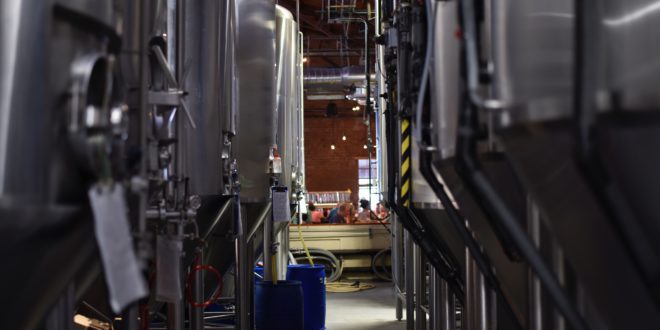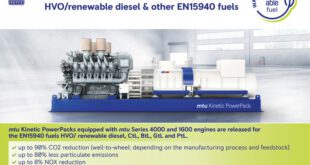Americans sure do love to drink beer. The U.S. beer market reached $111.4 billion in sales in 2017, and regional facilities and craft breweries alike produced 25 million barrels during the same year. These impressive figures are leading more breweries to make the move toward sustainability in an effort to offset energy production costs and reduce their overall environmental impact.
A number of breweries are already at the forefront of sustainability efforts, joining the ranks of forward-thinking wineries powered by alternative energy such as Far Niente and Anaba, both of which are located in Northern California. Colorado’s New Belgium Brewing, for example, diverts 99 percent of its waste from landfills and taxes itself on purchased energy consumption.
Research shows that an ever-increasing segment of the consumer market cares about a company’s sustainability efforts, especially Generation Z and millennials. In a recent survey, 81 percent of global respondents said that companies should do their part to help improve the environment. If you’re among the growing number that believes in the need for corporate sustainability and you also drink beer, you can use your purchasing power to support breweries that use alternative energy and that are committed to environmentally friendly business practices.
Alternative Energy and the Beer Industry
Along with New Belgium, breweries of all sizes are playing an active role in the push towards widespread sustainability. Many are harnessing alternative energy, including wind and solar, to power their facilities. Beer production uses massive amounts of energy, and offsetting that power from sustainable channels helps reduce carbon emissions and other air pollutants.
One of the most notable of these breweries is Deschutes Brewery in Bend, Oregon. The brewery uses an estimated 5.6 million kilowatt hours (kWh) of energy annually and offsets that energy production at an astounding rate of 116 percent. The company also uses 70 percent recycled glass in its bottle manufacturing process and recycles hot air discharge from air compressors, using it to heat cellars during the winter months.
But craft and microbreweries aren’t the only facilities forging a sustainable path. Budweiser is the most popular beer in the world, with 41 million bottles sold globally every day, and the beer is now brewed using 100 percent renewable energy. New logos announcing the feat can be found on bottles and cans of Budweiser.
Sustainable Advertising Efforts
Budweiser’s on-bottle renewable energy production announcement is just the beginning when it comes to letting customers know about sustainability efforts. In 2017, Coors Light was part of a large-scale TV marketing campaign called “Every One Can.” The campaign’s aims were twofold: The MillerCoors brand wanted to encourage drinkers to recycle their cans, as well as shine a spotlight on company-wide sustainability efforts. Specifically, MillerCoors partnered with TerraCycle to convert used vinyl billboards into eco-friendly beer cooler bags, and the company wanted their eco-savvy customers to be aware of their moves toward improved sustainability.
Despite the prevalence of streaming services and online entertainment, TV remains the preferred channel for advertising among beer producers. About 90 percent of advertising budgets within the alcohol industry are spent on TV ads. There are numerous regulations and requirements placed on those ads. For example, beer and malt beverage producers must provide their company’s name and physical address, as well as the class of product, such as ale, lager, or stout.
Alcoholic beverage companies continue to rely heavily on TV advertising campaigns because they display greater success with key performance indicators than other forms of advertising, even in our modern digital era. In fact, TV advertisements generate four times the return on investment than digital advertising. And if the recent growth of the beer industry is any indication, today’s TV advertising campaigns aren’t going unnoticed.
The Dark Side of Beer
Gallup polls in recent years consistently place beer at the top of the list of preferred alcoholic beverages. About 62 percent of Americans imbibe at least occasionally, and of those, 40 percent prefer beer over wine and liquor. A continued preference for beer among U.S. drinkers is one of the reasons for the continued growth of the industry as a whole.
As of 2018, there are more than 7,000 breweries across the country, with the number of breweries in several cities, including Chicago, Portland, Seattle, and San Diego, reaching the triple digits. The influx of breweries has contributed more than $76 billion to local economies and created 500,000 jobs.
But it’s not all good news where beer popularity is concerned. DUIs are on the rise, and regular drinking can lead to health problems, including high blood pressure and heart and liver disease.
Driving under the influence is a preventable consequence of alcohol consumption that contributes to 29 fatalities every day. In 2016, one out of every 222 adults was arrested for drunk driving, which means having a blood alcohol concentration (BAC) of 0.08 percent or higher. That percentage is universal across all U.S. states and Washington, D.C. A BAC level of 0.08 is indicative of poor muscle coordination, slower reaction times, and impaired judgment, which is why it’s dangerous to get behind the wheel at that level of intoxication.
Choosing to support breweries that use alternative energy is just one small step you can take to help cultivate a more sustainable lifestyle. You can learn about sustainable brewing efforts via a brewery’s website, TV ads, or on the product labels themselves in order to make a more informed decision regarding your beverage choices. No matter which eco-friendly breweries you ultimately support, make sure you know your limits, and never drive under the influence.
 Alternative Energy HQ solar power for homes, wind energy, and bio fuel issues
Alternative Energy HQ solar power for homes, wind energy, and bio fuel issues








One comment
Pingback: Why You Should Support Breweries That Use Alternative Energy